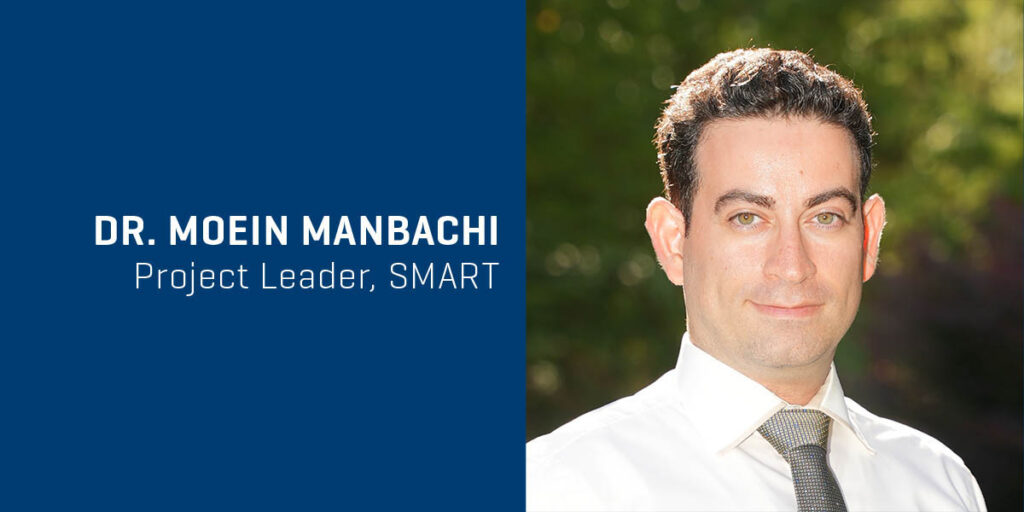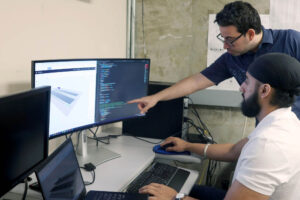
Dr. Moein Manbachi is a Project Leader with the BCIT Smart Microgrid Applied Research Team (SMART), where he advances applied research in critical energy infrastructure cybersecurity and digital twin technologies. Moein’s work explores how operational technology (OT) systems, the systems that run our power grids and other essential networks, can be made more resilient, intelligent, and secure through digital transformation and advanced analytics.
In October, just in time to celebrate Cybersecurity Awareness month, Dr. Manbachi was awarded 1.21 million from the National Cybersecurity Consortium (NCC) to fund two projects: the Digital Twin Platform for Critical Infrastructure Cybersecurity Modeling and Assessment, and the Critical Infrastructure Cybersecurity Experiential Training Program. These projects will strengthen Canada’s cyber defenses and train the next generation of operational technology (OT) cybersecurity professionals advancing national resilience through innovation.
What is your role with SMART?

I lead applied R&D initiatives and labs focused on the future of energy systems, including digital twins, operational technology (OT) cybersecurity, and real-time grid simulation. I joined BCIT in 2015 as an instructor and in 2017 as a research associate with SMART at the BCIT Centre for Applied Research and Innovation (CARI) and have since been working closely with industry, academia, and government partners to help build next-generation capabilities for Canada’s critical energy infrastructure.
What inspired you to pursue applied research?
I’ve always believed that research should translate into real-world impact. Applied research allows me to bridge advanced academic innovation with industry needs, delivering solutions that improve reliability, resilience, and cybersecurity in mission-critical energy systems.
What kinds of projects does your team typically work on?
SMART works on projects related to Digital Twins, power systems cybersecurity, microgrids & Virtual Power Plants, real-time simulation, EV charging infrastructure studies, battery recycling, and grid resiliency. These initiatives are essential because our energy infrastructure is rapidly evolving, and with growing renewable integration, large-load electrification, and rising cyber and climate-related threats, we must innovate faster than ever to ensure our power systems remain reliable, resilient, sustainable, and secure.
Can you share a recent project you’re proud of?
One project I am particularly proud of is our Future Skills Centre (FSC) partnership, which supported the development and delivery of the Virtualized Experiential Learning Platform (VELP). VELP allows learners and industry professionals to remotely access real-world operational technology, cybersecurity tools, and digital-twin-based grid environments, all through the cloud.
Through this initiative, we have trained professionals from utilities, industry, and academia across Canada, and created meaningful pathways for students to gain hands-on experience with real industrial equipment without needing to be physically in a lab. The impact has been tremendous:
Applied research is about solving real-world challenges. What’s challenge are you tackling right now?

A major challenge we’re addressing is decision-making under uncertainty in critical energy infrastructure, especially as we integrate more distributed and renewable energy resources, electrify large loads like data centers, and face increasing cyber, physical, and extreme-weather-driven risks. Real systems cannot afford trial-and-error, and traditional planning tools aren’t always equipped to handle fast-changing conditions, cyber threats, or extreme events. To address this, we are developing and applying digital-twin-enabled decision-support environments.
What excites you most about the future?
I’m excited about the convergence of AI, digital twins, and cyber-physical simulation. Over the next few years, we will see self-optimizing, self-healing energy systems that learn, adapt, and respond to disturbances in real-time. At BCIT Centre for Applied Research and Innovation (CARI), we’re building a new Centre for Critical Infrastructure Digital Twin Innovation, which will create a national hub for innovation, training, and collaboration in this space.
What advice would you give students or emerging researchers who want to get involved in applied research?
Be curious, stay hands-on, and focus on solving problems that truly matter.
Applied research thrives on collaboration, so don’t hesitate to connect with industry, ask questions, and develop practical solutions that move the needle. And as we innovate, remember that decisions in the energy sector influence not only technology and economics, but also social well-being and environmental sustainability. Keep those impacts in mind as you design solutions or study performances. The energy transition needs passionate, thoughtful, and community- and environment-minded innovators, and there has never been a more exciting time to be part of it.
Do you want to dive deeper into the world of smart grids and digital transformation?
Take Fundamentals of Substation Automation Systems or Smart Cities and Sustainable Transportation with Dr. Manbachi!
About SMART
The BCIT Smart Microgrid Applied Research Team (SMART) converges expertise in information technology, communications engineering, and energy management to develop advanced prototypes and solutions for complex applied research programs. At the forefront of its initiatives, SMART is advancing Digital Twin technologies for critical energy infrastructure, enabling real-time analysis, resilience testing, and intelligent decision-making. In parallel, the team leads R&D in OT cybersecurity, energy storage systems, and virtual power plant integration, addressing the evolving challenges of modern energy networks. Through strong collaborations with academia, industry, utilities, and government, SMART continues to strengthen BC’s innovation ecosystem and contribute to Canada’s energy transition.